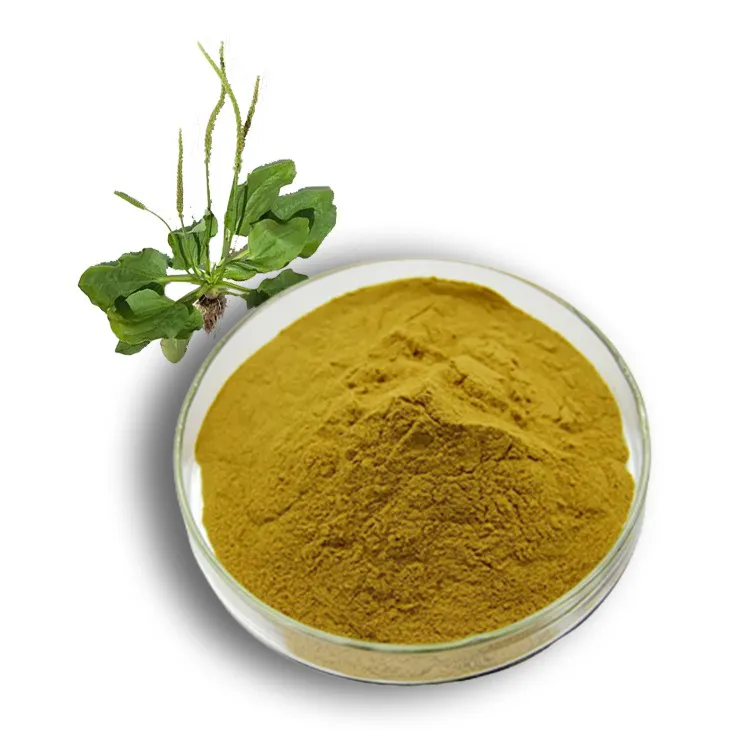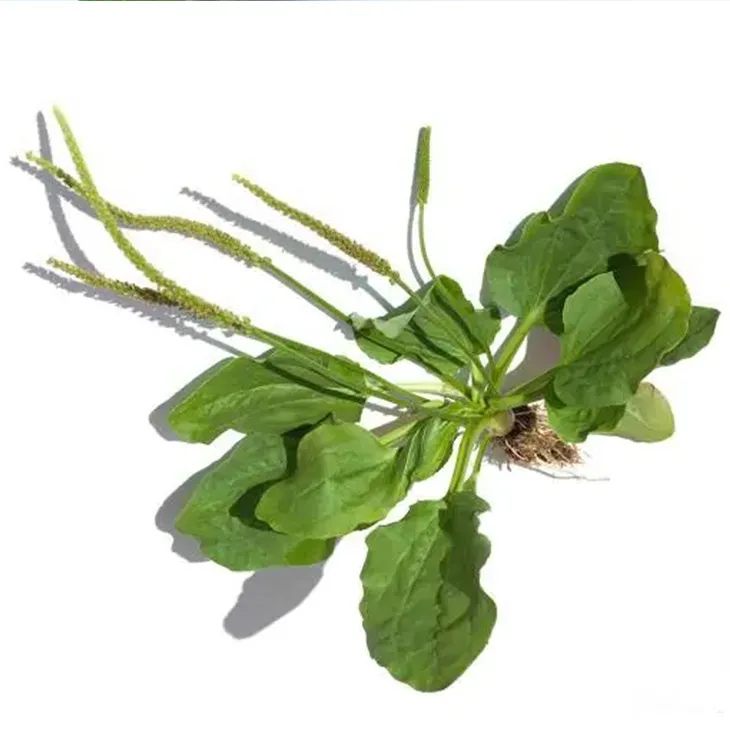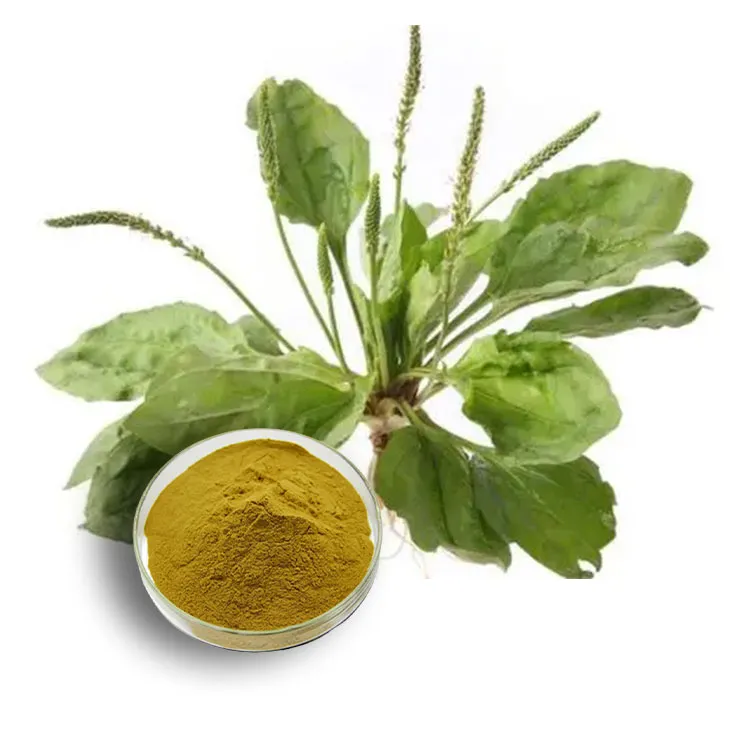- 0086-571-85302990
- sales@greenskybio.com
What is plantain extract and why is it used on the skin?
2024-11-13

1. Introduction to Plantago asiatica
Plantago asiatica, widely known as Asiatic plantain, is a remarkable plant that has been recognized for its various properties for a long time. It is a perennial herbaceous plant that can be found in many regions around the world. This plant has been used in traditional medicine systems for centuries, and its extract has become an interesting component in the field of skin care in recent years.

2. Composition of Plantago asiatica extract
The extract of Plantago asiatica is rich in a variety of active compounds. These include polyphenols, flavonoids, terpenoids, and alkaloids. Each of these components plays a crucial role in determining the properties and potential benefits of the extract when applied to the skin.
- Polyphenols: They are known for their antioxidant properties. In the context of skin health, polyphenols can help in protecting the skin from oxidative stress. Oxidative stress is caused by an imbalance between the production of free radicals and the body's ability to detoxify them. Free radicals can damage skin cells, leading to premature aging, wrinkles, and other skin problems. - Flavonoids: Flavonoids are another important group of compounds in Plantago asiatica extract. They have anti - inflammatory and antioxidant activities. For example, some flavonoids can inhibit the production of inflammatory mediators in the skin, thus reducing inflammation. - Terpenoids: Terpenoids can contribute to the antibacterial and antifungal properties of the extract. This is beneficial for the skin as it can help in preventing and treating skin infections caused by bacteria or fungi. - Alkaloids: Alkaloids may have various effects on the skin, such as modulating certain physiological processes at the cellular level.

3. Anti - inflammatory properties of Plantago asiatica extract
3.1 Causes of skin inflammation
Skin inflammation can be triggered by a multitude of factors. Allergies are a common cause. For instance, exposure to certain allergens like pollen, some cosmetic ingredients, or food substances that come into contact with the skin can lead to an allergic reaction. This reaction often involves the activation of the immune system in the skin, resulting in inflammation.
Another significant factor is environmental irritants. These can include pollutants in the air, harsh chemicals in cleaning products, or excessive sun exposure. When the skin is exposed to these irritants, it can become inflamed as a protective response.
3.2 How the extract soothes inflammation
The anti - inflammatory properties of Plantago asiatica extract work through multiple mechanisms. One way is by inhibiting the production of pro - inflammatory cytokines. Cytokines are small proteins that are involved in cell - to - cell communication in the immune system. When there is an overproduction of pro - inflammatory cytokines, it leads to increased inflammation. The extract can reduce this overproduction, thereby decreasing redness and swelling associated with skin inflammation.
Additionally, the extract can modulate the activity of immune cells in the skin. For example, it may reduce the activation of macrophages, which are cells that play a key role in the inflammatory response. By doing so, it helps to calm the inflamed skin.

4. Moisturizing effects of Plantago asiatica extract
4.1 Importance of skin hydration Maintaining proper skin hydration is essential for healthy skin. The outermost layer of the skin, the stratum corneum, acts as a barrier to protect the underlying tissues. When the skin is well - hydrated, this barrier function is enhanced. Hydrated skin also has a smoother texture, appears more plump, and is less likely to develop dryness, flakiness, or fine lines.
4.2 How the extract provides moisture
Plantago asiatica extract helps to keep the skin hydrated in several ways. One mechanism is by increasing the water - holding capacity of the skin cells. It may interact with the components in the skin cells, such as ceramides and natural moisturizing factors, to enhance their ability to retain water.
Another way is by preventing water loss from the skin. The extract can form a thin, protective layer on the skin surface, which reduces transepidermal water loss. This is similar to how some moisturizers work, but the natural components in the extract may offer a more gentle and long - lasting effect.
5. Antioxidant effects of Plantago asiatica extract
5.1 Role of antioxidants in skin health
Antioxidants are crucial for maintaining skin health. As mentioned earlier, free radicals are constantly generated in the body due to various factors such as exposure to UV radiation, pollution, and normal metabolic processes. These free radicals can cause oxidative damage to skin cells. Oxidative damage can affect the DNA, proteins, and lipids in the skin cells, leading to various skin problems including premature aging, pigmentation disorders, and reduced skin elasticity.
Antioxidants in Plantago asiatica extract can neutralize these free radicals. By donating an electron to the free radicals, they prevent the free radicals from causing further damage to the skin cells.
5.2 Specific antioxidant components in the extract
As mentioned before, the polyphenols and flavonoids in the extract are the main antioxidant components. For example, flavonoids like Quercetin and kaempferol have been shown to have strong antioxidant activities. These compounds can scavenge a wide range of free radicals, including superoxide anions, hydroxyl radicals, and singlet oxygen.
The antioxidant effects of these components not only protect the skin from external factors but also help in maintaining the overall health and function of the skin cells from within.
6. Other potential benefits of Plantago asiatica extract for skin
6.1 Wound healing
There is some evidence to suggest that Plantago asiatica extract may promote wound healing. It can stimulate the proliferation of skin cells, such as fibroblasts. Fibroblasts are responsible for producing collagen, which is an important component of the extracellular matrix in the skin. Collagen provides structural support to the skin and is crucial for the repair of damaged skin tissue.
The extract may also have antimicrobial properties during the wound - healing process, which can help prevent wound infections and promote faster healing.
6.2 Anti - aging effects beyond antioxidants
In addition to its antioxidant - mediated anti - aging effects, Plantago asiatica extract may have other mechanisms for combating aging. It could potentially affect the expression of certain genes related to skin aging. For example, it may regulate genes involved in the production of elastin, which is another important protein for maintaining skin elasticity.
It may also help in reducing the appearance of age spots by affecting the melanin - producing cells in the skin. Melanin is the pigment responsible for skin color, and an imbalance in melanin production can lead to the formation of age spots.
7. How to use Plantago asiatica extract in skin care
7.1 Available forms
Plantago asiatica extract is available in various forms for skin care use. It can be found in creams, lotions, serums, and masks. These products are formulated to deliver the beneficial properties of the extract to the skin.
- Creams: Creams are thicker in consistency and are often used for more intensive moisturizing. They are suitable for dry or mature skin types.
- Lotions: Lotions are lighter and are more easily absorbed by the skin. They are a good option for normal to combination skin.
- Serums: Serums are highly concentrated formulations that contain a high percentage of active ingredients. They are designed to penetrate deep into the skin and are often used for targeted skin concerns such as anti - aging or reducing inflammation.
- Masks: Masks are used for a more intensive treatment. They are usually left on the skin for a specific period of time to allow the active ingredients, including Plantago asiatica extract, to work effectively.
7.2 Precautions
While Plantago asiatica extract is generally considered safe for skin use, there are still some precautions to be taken.
- Patch test: Before using any product containing the extract on a large area of the skin, it is recommended to do a patch test. Apply a small amount of the product on a small area of the skin, such as the inner forearm, and wait for 24 - 48 hours to see if there are any adverse reactions such as redness, itching, or swelling.
- Allergic reactions: Some individuals may be allergic to Plantago asiatica or its extract. If you have a known allergy to plants in the Plantago genus or related plants, it is best to avoid using products containing the extract.
- Interaction with other products: When using products containing Plantago asiatica extract, be aware of any potential interactions with other skin care products you are using. For example, some ingredients may react with each other and reduce the effectiveness of the products or cause skin irritation.
8. Conclusion
Plantago asiatica extract offers a range of potential benefits for skin health. Its anti - inflammatory, moisturizing, and antioxidant properties make it a valuable ingredient in skin care products. Additionally, it may have other benefits such as promoting wound healing and combating skin aging through various mechanisms. However, it is important to use products containing the extract with caution, following the appropriate precautions. With further research, more insights into the full potential of Plantago asiatica extract for skin health are likely to be uncovered.
FAQ:
1. What are the main active compounds in Plantago asiatica extract?
Plantago asiatica extract contains various active compounds. Some of the main ones include polysaccharides, flavonoids, and phenolic acids. These compounds contribute to its anti - inflammatory, moisturizing, and antioxidant properties.
2. Is Plantago asiatica extract suitable for all skin types?
Generally, Plantago asiatica extract is suitable for most skin types. However, individuals with extremely sensitive skin may need to do a patch test first. Since it has anti - inflammatory and moisturizing properties, it can be beneficial for dry, normal, and oily skin. But if someone has a specific allergy to plants in the Plantago genus, they should avoid using it.
3. How is Plantago asiatica extract processed for skin use?
The processing of Plantago asiatica extract for skin use typically involves several steps. First, the plant is harvested and carefully cleaned. Then, extraction methods such as solvent extraction or supercritical fluid extraction may be used to obtain the active compounds. After extraction, the extract is purified and formulated into products like creams, lotions, or serums suitable for skin application.
4. Can Plantago asiatica extract help with acne - prone skin?
Yes, it can be helpful for acne - prone skin. Its anti - inflammatory properties can reduce the inflammation associated with acne. Also, by keeping the skin hydrated, it can help maintain the skin's natural barrier function, which is important in preventing acne breakouts. However, it should be used as part of a comprehensive skincare routine and not as the sole treatment for acne.
5. Are there any side effects of using Plantago asiatica extract on the skin?
While Plantago asiatica extract is generally safe for skin use, some potential side effects may occur. In rare cases, it may cause mild skin irritation or allergic reactions, especially in those with sensitive skin or allergies to related plants. If any redness, itching, or discomfort occurs after using products containing this extract, it is advisable to stop using it immediately and consult a dermatologist.
Related literature
- The Medicinal Properties of Plantago asiatica: A Comprehensive Review"
- "Antioxidant and Anti - Inflammatory Activities of Plantago asiatica Extract in Skin Health"
- "Utilization of Plantago asiatica in Cosmetic Formulations for Skin Moisturization"
- ▶ Hesperidin
- ▶ Citrus Bioflavonoids
- ▶ Plant Extract
- ▶ lycopene
- ▶ Diosmin
- ▶ Grape seed extract
- ▶ Sea buckthorn Juice Powder
- ▶ Fruit Juice Powder
- ▶ Hops Extract
- ▶ Artichoke Extract
- ▶ Mushroom extract
- ▶ Astaxanthin
- ▶ Green Tea Extract
- ▶ Curcumin
- ▶ Horse Chestnut Extract
- ▶ Other Product
- ▶ Boswellia Serrata Extract
- ▶ Resveratrol
- ▶ Marigold Extract
- ▶ Grape Leaf Extract
- ▶ New Product
- ▶ Aminolevulinic acid
- ▶ Cranberry Extract
- ▶ Red Yeast Rice
- ▶ Red Wine Extract
-
Red Date Extract
2024-11-13
-
Aminolevulinic acid
2024-11-13
-
Eyebright Extract
2024-11-13
-
Troxerutin
2024-11-13
-
Hericium erinaceus extract powder
2024-11-13
-
Genistein
2024-11-13
-
Plantain extract
2024-11-13
-
Ivy Extract
2024-11-13
-
Lycopene
2024-11-13
-
Bilberry Extract
2024-11-13




















